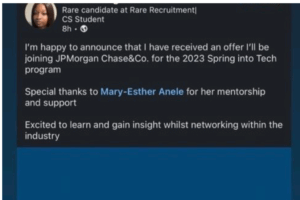If you’ve been applying for graduate trainee roles, you already know the struggle. Hundreds of people apply, only a handful even get past the online tests, and interviews can feel like a different language.
Everyone keeps asking me: “How did you get an internship at two Big 4 as a Law student?” or “What’s the secret to cracking companies like global companies or the big consulting firms?”
The truth is, most people don’t fail at interviews because they’re not smart enough. They fail because they’re not prepared enough.
That’s what this article is about: breaking down the steps you can take to dramatically increase your chances. And at the end, I will also share some resources and materials that have helped many candidates move from rejection emails to offer letters.
But before we dive into the “how,” let’s clear up a myth that holds back far too many graduates.
You don’t have to get a job in the same field you studied.
Your degree is a foundation, not a prison sentence. Graduate trainee programs don’t require you to have years of professional experience, nor do they expect you to be tied to your academic major. What they value most is enthusiasm, adaptability, and potential.
That’s why you will often see:
a Law graduate working as an Investment Analyst at Goldman Sachs,
an Economics student thriving as a Data Analyst in a tech company,
or a History graduate building a career in consulting at Deloitte.

These stories aren’t exceptions; they’re the rule that graduate trainee programs are designed to give you the training, exposure, and mentorship to pivot into industries you may never have studied in school. The world is changing, and the job market is evolving; employers are now realizing that what they need are graduates who are curious, willing to learn, and able to solve problems, not just people who have memorized textbooks. That’s why your career interest often matters more than your course of study.
So, whether you studied medicine, engineering, political science, or even fine arts, you can still break into finance, consulting, tech, or FMCG through the graduate trainee route. All you need is the right mindset, preparation, and resources, which is exactly what we will cover in this guide.
1. Understand What Graduate Trainee Roles Really Are
Graduate trainee programs are not just jobs to fill your CV after university; they’re carefully designed pipelines that companies use to discover, train, and groom their future leaders. That’s why firms like Deloitte, PwC, KPMG, banks, FMCGs, and tech giants invest heavily in them. They aren’t looking for people who know it all already; they’re looking for graduates who can learn quickly, adapt to new environments, and show sparks of leadership potential. This is why you’ll often find people working in fields far from their degree—law graduates excelling as investment analysts, or economics graduates thriving as data analysts in tech. Employers aren’t hiring your degree; they’re hiring your ability to learn, your curiosity, and your attitude. Once you understand that graduate trainee roles are built around potential rather than perfection, the pressure to “fit” your studies into your career disappears and you can focus on positioning yourself as someone ready to grow.
2. Don’t Sleep on the Exam Stage
The truth most graduates don’t want to hear is that many never make it past the exam stage. Companies receive thousands of applications, and online assessments are the fastest way to filter them down. These tests may include numerical reasoning, logical reasoning, and verbal reasoning assessments, situational judgment tests that evaluate how you’d respond in workplace scenarios, and sometimes case studies or technical tasks depending on the industry. They are tough not because the questions are impossible, but because most people underestimate them. Passing these exams isn’t about raw intelligence; it’s about practice. The more you expose yourself to the format, the better you recognize patterns and sharpen your speed. Think of it like training for a marathon; nobody runs 42km on their first day, but consistent practice makes you fit for the challenge. That’s why preparation here is non-negotiable. The CV may get you invited, but the exam is the gatekeeper.
3. Learn to Tell Your Story
Interviews are where many graduates stumble because they treat them like exams—listing achievements without context, when in reality, interviews are about storytelling. Companies want to know how your past experiences connect to the skills they need. Saying “I was in a student association” is forgettable; saying “As treasurer, I managed funds, balanced competing interests, and built stakeholder trust, skills I can apply to managing client accounts at Deloitte” is memorable. One is generic, the other is relevant and tailored. Storytelling doesn’t mean inventing grand adventures; it means framing even simple experiences in a way that demonstrates transferable skills. Whether you were a class representative, part of a volunteer group, or led a project in school, there is always a way to connect it back to problem-solving, teamwork, leadership, or communication. The best candidates don’t just answer questions; they craft narratives that make recruiters see them as future colleagues.
4. Build the Right Skills Early
While waiting for applications to open, many graduates make the mistake of doing nothing, thinking they will “figure it out when the time comes.” The smarter move is to use this waiting period to build the very skills employers are looking for. Practice presenting your ideas clearly, whether in class, group projects, or even online communities. Moreover, try case studies, hackathons, and competitions to sharpen your ability to think under pressure. Lastly, build digital skills. Knowing Excel, Power BI, SQL, or even basic data analysis tools makes you stand out instantly.
5. Network Like It Matters (Because It Does)
Many graduates shy away from networking because they think, “I don’t know anyone important” or “I’m too junior to network.” The truth is, networking isn’t about having a long list of influential contacts; it’s about building genuine relationships that can open doors later. For graduate trainee roles, this can make a huge difference. Start with what’s closest to you: connect with alumni from your university who already work at companies you admire, and don’t be afraid to send them a polite message asking about their career journey. Attend career fairs, industry webinars, and virtual open days hosted by firms, these are not just for show; recruiters often take note of participants who ask thoughtful questions. On LinkedIn, go beyond just following companies, comment intelligently on their posts, engage with employees’ updates, and gradually make yourself visible in their community. When reaching out, avoid vague requests like “Can you help me get a job?” Instead, ask specific, curiosity-driven questions such as: “What qualities helped you succeed as a graduate trainee here?” or “What do you wish you had prepared for before joining this firm?”
Another underrated networking tactic is peer networking. Your classmates and fellow applicants are future professionals, too. Today’s study group member might be tomorrow’s HR associate who flags your CV. Lastly, remember that networking is about giving as much as receiving. Share opportunities you come across, recommend resources, or connect people. When you become known as someone who adds value, your network grows organically.

6. Research the Company Like It’s Your Exam
One of the easiest ways to stand out in a graduate trainee process is by knowing the company better than other applicants. Too many candidates walk into interviews with surface-level knowledge, “Deloitte is a consulting firm,” or “Unilever makes FMCG products.” That won’t impress anyone. Instead, dig deeper. Read annual reports, follow company news, and understand their values and recent projects. If you’re interviewing with a bank, know their latest digital banking initiative. If it’s a tech firm, understand how they’re positioning themselves in AI or data. Recruiters are quick to spot who has done their homework, and being able to say, “I noticed your recent partnership with X, and I’m curious how graduate trainees contribute to projects like that,” instantly puts you in the top percentile.
7. Craft a CV That Speaks Their Language
Your CV is the first impression, and for graduate trainee roles, it’s less about listing everything you’ve ever done and more about showing relevance. Tailor your CV to highlight transferable skills: leadership, teamwork, problem-solving, and adaptability. For example, don’t just write: “Organized events as part of student society.” Instead: “Led a team of 10 to organize campus events for 500+ students, managing budgets and logistics under tight deadlines.” The second version tells a story of responsibility and leadership.

8. Practice Mock Interviews
No matter how much you prepare on paper, interviews require practice. Sitting across from a recruiter and answering on the spot is very different from rehearsing answers in your head. Find a friend, mentor, or even use online platforms to practice mock interviews. Focus on clarity, structure, and confidence. Use frameworks like STAR (Situation, Task, Action, Result) to keep your answers sharp. Also, practice HireVue interviews; many firms now use AI-driven platforms where you record answers with no interviewer present. The more you practice speaking confidently on camera, the less awkward it will feel on the real day.
9. Develop Commercial Awareness
This is one of the most underrated skills graduates overlook. Commercial awareness means understanding how businesses make money, what challenges they face, and how industries are changing. For example, if you’re applying to a bank, you should know about fintech disruption. If it’s a consulting firm, you should understand how digital transformation is reshaping clients. Reading business news, following industry blogs, or listening to podcasts can help. In interviews, you might be asked: “What’s a business challenge you think our company faces right now?” A thoughtful answer here can separate you from candidates who only prepared generic answers.
10. Manage Your Time and Energy During Applications
Graduate trainee applications can be overwhelming, and it’s easy to burn out. To manage your applications more efficiently, it’s important to treat the process like a project: they create spreadsheets to track deadlines, allocate specific days for test practice, and prepare systematically. They also pace themselves on quality over quantity matters. Applying to 10 roles with strong, tailored applications is better than sending 50 rushed ones. Remember, resilience isn’t just about enduring rejection; it’s also about managing the process without losing motivation.
So to anyone reading this, your degree is just the starting line, and no matter what you studied, it’s in your power to determine how your career progresses. Graduate trainee programs exist to spot potential, not perfection. Finally, if you take nothing else from this guide, take this: you don’t need the “perfect” background, you need a repeatable system for showing up prepared.

Resources and Materials To Help You Stand Out in Your Graduate Positions
- Entry Level Graduate Internship Template for Companies
- BiG 4 (KPMG, PWC, DELOITTEE, EY) and Dragnet Assessment Past Questions and Solutions (Free)
- SHL Practice Tests (Free)
- Goldman Sachs HireVue Mock Interview Resources (Free)
- 47 case interview examples (from McKinsey, BCG, Bain, etc.) Free
- BCG Online Case Overview and Sample Questions (FREE)
Latest 2025 Graduate Opportunities to Apply For
- Analyst at Co Impact
- Rotational Product Manager Program at Meta
- Summer 2025 Analyst Programme at Goldman Sachs
- Graduate Programme 2026 United Kingdom at Equinox
- Unilever Future Leaders Programme
- Legal Internship Programme at IBA
- Research NVIDIA Graduate Fellowship Program
Goodluck Superstar!
